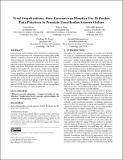| dc.contributor.author | Lee, Crystal Jayne | |
| dc.contributor.author | Yang, Tanya | |
| dc.contributor.author | Inchoco, Gabrielle D | |
| dc.contributor.author | Jones, Graham M. | |
| dc.contributor.author | Satyanarayan, Arvind | |
| dc.date.accessioned | 2021-07-26T14:52:14Z | |
| dc.date.available | 2021-07-26T14:52:14Z | |
| dc.date.issued | 2021-05 | |
| dc.identifier.isbn | 978-1-4503-8096-6 | |
| dc.identifier.uri | https://hdl.handle.net/1721.1/131130 | |
| dc.description.abstract | Controversial understandings of the coronavirus pandemic have turned data visualizations into a battleground. Defying public health officials, coronavirus skeptics on US social media spent much of 2020 creating data
visualizations showing that the government's pandemic response was excessive and that the crisis was over. This paper investigates how pandemic visualizations circulated on social media, and shows that people who mistrust
the scientific establishment often deploy the same rhetorics of data-driven decision-making used by experts, but to advocate for radical policy changes. Using a quantitative analysis of how visualizations spread on Twitter and an
ethnographic approach to analyzing conversations about COVID data on Facebook, we document an epistemological gap that leads pro- and anti-mask groups to draw drastically different inferences from similar data. Ultimately, we argue that the deployment of COVID data visualizations reflect a deeper sociopolitical rift regarding the place of science in public life. | en_US |
| dc.language.iso | en | |
| dc.publisher | Association for Computing Machinery (ACM) | en_US |
| dc.relation.isversionof | http://dx.doi.org/10.1145/3411764.3445211 | en_US |
| dc.rights | Creative Commons Attribution 4.0 International license | en_US |
| dc.rights.uri | https://creativecommons.org/licenses/by/4.0/ | en_US |
| dc.source | ACM | en_US |
| dc.title | Viral Visualizations: How Coronavirus Skeptics Use Orthodox Data Practices to Promote Unorthodox Science Online | en_US |
| dc.type | Article | en_US |
| dc.identifier.citation | Lee, Crystal et al. "Viral Visualizations: How Coronavirus Skeptics Use Orthodox Data Practices to Promote Unorthodox Science Online." Proceedings of the 2021 CHI Conference on Human Factors in Computing Systems, May 2021, Yokohama, Japan, Association for Computing Machinery, May 2021. © 2021 The Authors | en_US |
| dc.contributor.department | Massachusetts Institute of Technology. Department of Electrical Engineering and Computer Science | en_US |
| dc.relation.journal | Proceedings of the 2021 CHI Conference on Human Factors in Computing Systems | en_US |
| dc.eprint.version | Final published version | en_US |
| dc.type.uri | http://purl.org/eprint/type/ConferencePaper | en_US |
| eprint.status | http://purl.org/eprint/status/NonPeerReviewed | en_US |
| dc.date.updated | 2021-07-23T14:38:10Z | |
| dspace.orderedauthors | Lee, C; Yang, T; Inchoco, GD; Jones, GM; Satyanarayan, A | en_US |
| dspace.date.submission | 2021-07-23T14:38:11Z | |
| mit.license | PUBLISHER_CC | |
| mit.metadata.status | Complete | |
